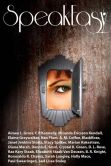Review of SpeakEasy by Lissa Staley
Overview from www.barnesandnoble.com: It’s a chick-lit mystery with some history, written collaboratively by over 20 local authors as part of the community novel project of the Topeka and Shawnee County Public Library. In modern-day Kansas, Ronni Long interviews 108 year old Julia, who doubts all the adventures of her long life should be revisited. As the mystery unfolds, Julia’s secrets and Ronni’s lies put both women in danger.
My Review:
This story is easily a first for me both as a
reviewer and a reader. The story has multiple authors. A separate author for
each chapter in fact. And when I read that (about the different authors) along
with the premise of the story, I knew I just had to try this one out.
The premise I alluded to earlier center’s around the
lives of two of our main characters: Ronni and Julia. Ronni is a graduate anthropology
student writing her dissertation about the Prohibition Era in Topeka when she
finds out about Julia Stanford.
Julia is 106 years old, I think (I don’t remember
the exact age right now but it is a few years over a hundred), and has worked
in a well-known speakeasy of the time called Mike’s Mirage. At the start of our
story she quietly resides in a local nursing home where Ronni hopes to
interview her for her project.
Of course there are several things that conspire to
keep that from happening, the first of which is car trouble. But Ronni quickly
finds a ride only to encounter more problems. As we are drawn into the story we
find out that no one is what they seem. Nearly everyone has something to hide.
We go along for the ride to find out what and why.
The positives on this one are first and foremost the
premise and the story. Who doesn’t love a good mystery combined with historical
fiction?
The characters are great too. Well most of them
anyway. The secrets we later find out about the guys in Pete’s band and Charles
as well as Pete’s grandfather seems to stretch credibility. I can understand
the main characters having secret lives but in this story practically everyone
has a secret and that was a little hard for me to swallow.
Also, narrative voice does seem to suffer a bit from
having multiple authors. And some of the continuity isn’t there. In one of the
first chapters we see that despite having spent time in the auto shop, Ronni’s
car still doesn’t work quite right but then in the next chapter she is seen
driving it back to Julia’a with no problems or explanations. It just doesn’t
make sense.
Some of the characters even seem to speak
differently from one chapter to the next. I realize that they all have
something that they are trying to hide so they might act differently from one
scene to the next but somehow it just didn’t fit together the way it should.
On the plus side, it was valuable lesson for me that
the proverbial “they” are right when they say you can usually distinguish one
author’s voice from another, even when they are trying to imitate someone else.
I noticed a difference in tone from one author to another in most cases even if
they didn’t all stand out like a sore thumb.
Still, I am recommending this book as a good read.
It is interesting and worth the time.

